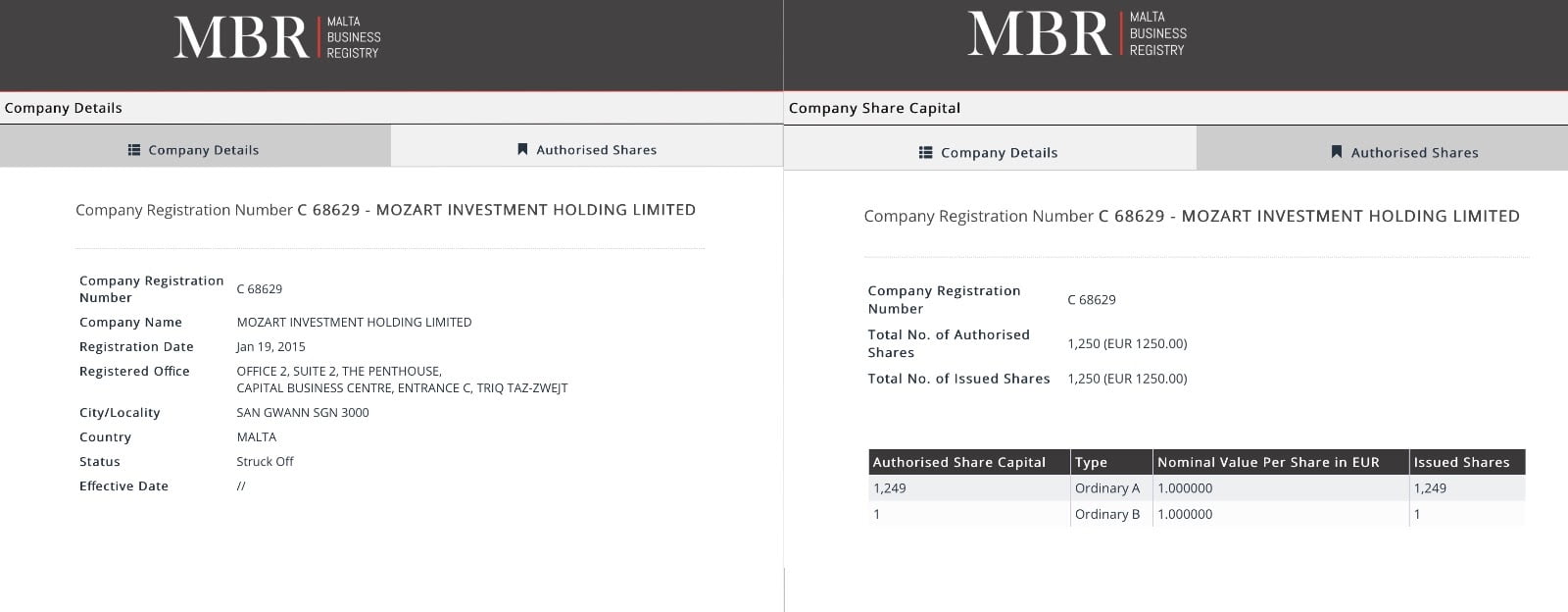Following criticism of the Malta Business Registry’s indiscriminate purge of company records, Economy Minister Silvio Schembri reacted on Thursday by blaming Moneyval and failed to commit to reinstating the data as called for by the journalists’ association.
In a joint statement, the IGM and the Daphne Caruana Galizia Foundation had called for online access to company data on the Malta Business Registry to be reinstated after the data of some 30,000 closed companies was removed from the system, limiting the ability of investigative journalists, compliance professionals and even foreign authorities to do their job.
The Minister’s reply said the purge of the online system is “a requirement of Moneyval”. Schembri misleadingly claimed that the European watchdog’s recommendation that inactive companies “be removed from the Registry” justified the denial of the public’s access to historical information about them.
The purge of company data
Earlier this year the MBR announced that it was undertaking an exercise to strike off (i.e. close) dormant companies from the Registry; an exercise which led to the striking off of hundreds of abandoned companies. The Shift showed the MBR went much further than that.
The MBR also purged all meaningful data relating to all struck off companies from the Registry’s online system going back over 30 years.
Overnight, journalists were no longer able to access information relating to over 30,000 closed companies, many of which were either shell companies or potentially included evidence of criminal activity.
Worse, the MBR was removing all information within hours of a company being closed, leaving just the name of the company and its former company number.

After the MBR’s purge, details of beneficial owners, shareholders, directors and other officers as well as accounts and other corporate filings by closed companies are no longer accessible online. In image: All that can now be accessed on Mr. Khangah’s, the Azeri oligarch, since Maltese closed companies set up by Nexia BT in 2015.
The Shift reported that, since online searches have now been hampered, journalists now have to physically visit the MBR’s offices in Zejtun and pay a fee in order to even begin researching in the paper-based archives held there.
Although the MBR sought to justify this highly secretive approach by pointing to data protection laws, legal experts consulted by The Shift debunked this.
Lawyers cautioned that data protection laws should not be used as a carte blanche for public authorities to restrict the public’s right to information or purge data from a public register.
The MBR ignored The Shift’s questions on this new practice.
Warnings by journalists and anti-corruption activists ignored
In a statement issued yesterday, the Daphne Caruana Galizia Foundation and the IGM warned the government that this practice was impairing the public’s right to know and hampering investigative journalism. The joint statement also explained how this lack of transparency was helping criminals that use Maltese companies for illicit purposes to disappear undetected.
A company could be set up in Malta, move millions and then, after being closed down, disappear without a trace other than a company name and a number. Criminals could even change the name just before closing down the company which would completely sever any ties with the suspect transactions.
The government again ignored this statement.
Echoing and supporting concerns about the lack of transparency, the Opposition also issued its own statement.
The government did not ignore this.
In a highly partisan response issued through DOI, the Economy Ministry accused the Opposition of seeking to “cause harm [to the country]”.
The response said the Ministry refutes the Opposition’s “insinuations that information vanishes from or is deleted from the MBR”, vexatiously pointing out that the removed information is still available in the paper files at their offices.
Implicitly acknowledging that the public and journalists are effectively being denied online access, the Ministry tauntingly noted that “continuous access”, however, remains for “competent authorities such as the Police Force, the Tax Commissioner, the MGA and the MFSA”.
Minister’s argument thrashed
Perhaps acknowledging that data protection was nonsensical as an argument, the Ministry has tried a different tack by blaming Moneyval.
Lawyers familiar with Moneyval’s recommendations pointed out that the Ministry is likely conflating, on the one hand, Moneyval’s recommendation to “strike delinquent companies off the [company] register” (an expression meaning to “close down” abandoned companies, which process it appears to have started) with, on the other hand, hiding historical information from the public.

Excerpt from Moneyval’s 2019 report on Malta.
Sources consulted by The Shift added that, given that international money laundering norms treat secretive and repressive jurisdictions as suspect or “higher risk”, Moneyval is unlikely to treat this recent decision to hide corporate information kindly.
Calling the statement supporting an anti-corruption NGO and Malta’s journalists’ warnings a “deplorable attack”, the Ministry went on to claim that the “timing [of this statement], at such a delicate moment, is designed to endanger the economy and 12,000 jobs in the financial services sector”.
Longstanding practitioners in the Maltese financial services industry consulted by The Shift pointed out that this is untrue, noting that opaqueness and lack of transparency is hurting the already ailing industry rather than helping it.
Practitioners noted that unless Malta wishes to attract the wrong kind of business, more so in light of recent scrutiny including by Moneyval, the global expectation is for more transparency rather than less.
As an example, they noted, the UK who used to archive company information older than six years is now in the process of restoring all historical information online.
Malta went in the opposite direction.












